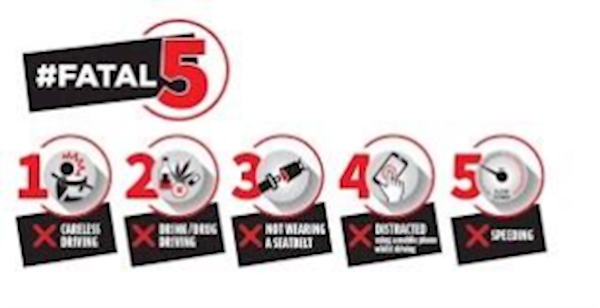
|
||
|
|
||
|
||
|
#Fatal5 – No 2. Speeding |
||
|
Hi Howley & Fairfield
There are 5 main contributing factors to Road Traffic Collisions. These are careless driving, drink and drug driving, not wearing a seatbelt, using a mobile phone, and speeding.
The second of our explanations explores UK speed limits; considerations, minimum speed limits, consequences of speeding, tips for staying within the limits and speed limit myths exposed.
What are the UK speed limits?
Speed limits in the UK are set based on the type of road and vehicle you are driving. The most common speed limits are: 30mph in built-up areas with street lighting (unless stated otherwise) 60mph on single carriageway roads 70mph on dual carriageways and motorways It’s good to remember that these limits apply unless signs indicate otherwise. Some roads have lower limits due to safety concerns, such as areas near schools or sharp bends. Always pay attention to road signs to avoid speeding above the limit.
Other things to consider when it comes to your speed on UK roads Being a good driver is not just about following the rules; knowing how to adapt your speed to road and weather conditions is just as crucial. You’ll need to adjust your speed in the following scenarios: Wet or icy roads Foggy conditions Heavy traffic
Are there minimum speed limits in the UK? There aren’t many minimum speed limits in the UK but they do exist in certain areas, such as tunnels or high-speed roads where slow-moving traffic could cause danger. These are marked by blue circular signs with a number indicating the minimum speed required. Driving too slowly – especially on fast-moving roads such as motorways – can be considered careless driving and may attract attention from the police.
What happens if you exceed the speed limit?
Speeding comes with penalties that can affect both your licence and finances. The consequences include: Minimum fine of £100 and three penalty points on your licence Court prosecution for excessive speeding, leading to higher fines and potential bans If you accumulate 12 points or more on your licence within three years, this could also result in a driving disqualification. For newly qualified drivers, accumulating 6 points in the first 2 years results in revocation of the full license and a re-test. Speed cameras, mobile police units, and speed zones all enforce speed limits. If you are caught speeding, you may be offered a speed awareness course instead of points, depending on the circumstances.
Tips for staying within the speed limit Here are a few tips to help ensure you remain safe and legal on the roads: Use cruise control: many modern cars have a cruise control to help maintain your speed Pay attention to road signs: speed limits can change suddenly, especially when entering towns or built-up areas Check your speedometer regularly: it’s easier to go above the limit than you might realise
Speed limit myths Like anything, there are loads of urban myths around speed limits in the UK. Understanding what they are and why they’re false can help ensure you aren’t accidentally breaking the law, protecting your wallet and license. “You can go 10%+2 over the speed limit without getting fined.” The truth is that you can still be fined for exceeding the limit by just 1mph. It’s not a legal right that you’re able to drive 10%+2 above the speed limit “Speed limits don’t apply at night when roads are empty.” Speed limits apply 24/7, regardless of how busy or how late it is “You can speed up past a fixed camera, then slow down, and avoid a ticket”. While this applies to old-style fixed cameras, average speed cameras measure your average speed between two points, so you can still be caught for speeding up in between. “You don't need to worry about speed cameras because they won't have time to record your plate if you drive really fast”. Modern cameras are designed to catch vehicles at high speeds. “Speed cameras need to be yellow to be legal.” While many are painted yellow for deterrence, this is not a legal requirement for their enforceability. "Not seeing a camera flash means you weren't caught.” Many modern cameras use digital technology and infrared sensors that don't flash, so they can catch you without a visible flash. "Speedometers can be inaccurate, so they provide an excuse for speeding.” While there's some leeway, the inaccuracy of your speedometer does not excuse you for exceeding the limit. “You only get caught if you don't get a Notice of Intended Prosecution (NIP) within 14 days.” While an NIP must be sent within 14 days, you can still be caught by a camera and receive a NIP later. “Driving at a very high speed is safe in bad weather.” Speed cameras are designed to work in all weather conditions, including rain and fog. "Speed cameras are just a money-making scheme.” Speed cameras are proven to increase road safety. A study found that cameras reduced road accidents by 17% to 39% and fatalities by 58% to 68%. “Police speed traps must be signposted.” Police do not need to place warning signs for mobile or fixed speed cameras. Warning signs are used as a deterrent, not as a legal requirement. “Flashing your headlights to warn other drivers of a speed van is a harmless gesture.” This can be considered obstructing a police officer in the execution of their duty and is a prosecutable offence under the Police Act 1997. “You can overpay a fine by £1 to make it invalid.” This is a baseless rumour. Overpaying a fine will not make it incomplete or void any penalty points. In fact, it could create additional administrative costs. "Speeding is acceptable because everyone does it.” This is a dangerous and incorrect belief. Exceeding the speed limit in any capacity is against the law and puts yourself and others at risk. Drivers are expected to adhere to the speed limit for the safety of all road users. “You can speed when overtaking another vehicle.” Speed limits apply at all times. You must ensure you can complete an overtaking manoeuvre safely without breaking the speed limit. “I don't have to tell my insurer about a speeding ticket or speed awareness Course." You must inform your insurance company immediately about any speeding offence. Failure to do so could invalidate your insurance policy.
Understanding UK speed limits isn’t just about avoiding fines – it’s about road safety and responsible driving. Always adjust your speed to the conditions and be aware of changing limits to keep yourself and others safe.
Kind regards Janet Price 20335 Howley & Fairfield | ||
Reply to this message | ||
|
|




